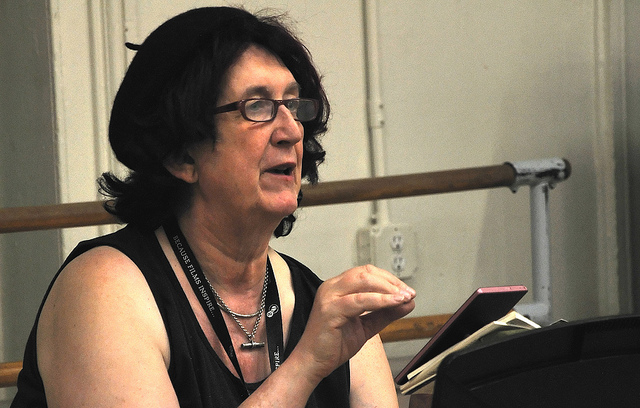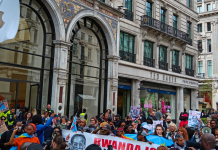Back in 2014, Time magazine ran a front cover featuring actress and trans activist Laverne Cox with the headline ‘The transgender tipping point’. In the past five years the number of trans figures in the public sphere has grown, whilst at the same time the murder rate of trans women, predominantly women of colour, hit its highest recorded point in the United States. To attempt to understand this contradiction, rs21’s Kate B interviews Roz Kaveney, UK-based writer and activist.

How would you describe yourself and your role in trans activism over the years?
I am a fairly binary identified trans woman, theoretically bisexual but mostly lesbian in practice. I transitioned in my middle to late 20s back in the 1970s, but knew about my trans identity and identified with the trans community from my mid-teens. My activism has partly consisted of writing occasional polemics and partly literary work, some of which deals with trans themes. I also do other political work as an out trans person thus helping normalise trans existence in the political realm – I was involved in the Gay Liberation Front, Sexual Fringe, Feminists Against Censorship, Liberty (where I was Deputy Chair) and the Gender and Sexuality Alliance. I’ve sat on a number of committees doing trans-related stuff including a deputation to the Equalities and Human Rights Commission over the Equality Act; the Royal Free hospital working group on trans medical care in the acute sector and the stakeholders’ group at Charing Cross Gender Identity Clinic. I’ve also been involved in the sort of activism which is just helping to look after individuals in the community.
What is the trans movement’s relationship to state institutions like the NHS, and how has it changed over the decades?
Back when I was thinking of transitioning and transitioned, my choices were radically affected by the personality and attitudes of doctors working in the field. Most clinics were run by doctors with very old-fashioned views about gendered behaviour and appearance; I am quite tall and that would have counted against me with some of them. You were supposed to pass and be as stealth as possible. These days most psychiatrists are generally more accepting of diversity in trans sexuality and lifestyles. However, waiting lists have grown and grown and access to hormones is far more restricted – this is a combination of a starved medical sector and undue caution that skirts cruelty.
Mainstream LGBT politics increasingly orients itself around the concept of rights and equality, and much of the discourse against homophobia and transphobia ends up being about ‘letting us live our lives ‘. Do you think there’s a limit to the politics of legitimacy and rights, and if so, how should we frame our calls for liberation?
This is one of the reasons why I got involved in controversies at Liberty about the concept of liberties as supplementary to rights. It should never be assumed that the state or society can make negative decisions about such questions as freedom of religion, freedom of political association or gender presentation. Things like access to medical care need to be negotiated but they should be so in the light of an ethic in which the state assists people to live free lives.
Recently we’ve seen a surge in international media coverage of trans issues, both in news and opinion coverage and in popular culture. This comes alongside a wave of legislative and governmental attention, notably in the US last week with the ‘bathroom bill’ and Obama pressing schools to allow students to self-identify their gender. Do you think mainstream reception of trans issues is changing, and if so, how and why?
It is the worst of times, it is the best of times. On one hand we are getting the rights and attention we deserve. Trans writers and actors have been actively discriminated against for a long time and that is ceasing to be the case. Inevitably, reactionary forces (having largely lost battles in other areas) are using trans people as the new battle-ground, exploiting the fact that we can be unpopular with our allies.
Do you think that the trans movement is an “individualistic” movement? If not, how would you respond to critics who call it that?
Self-determination is not the sort of individualism which tramples on the rights of others. When this claim comes from feminist women it is particularly bizarre as they have historically been accused of trampling on the rights of men. It is a besetting sin of the Left, to argue that these movements are putting themselves above all else – “wouldn’t it be less selfish comrade?”. It usually comes from the male ‘vanguard’ Left as a way of pursuing their own, often quite selfish, projects. The capacity of the trans community to look after its own should be a rebuttal in itself. It should be pointed out that that solidarity has been achieved in the face of attempts to force trans people into isolated secrecy by both medical gate-keepers and some progressives.
How is the concept of ‘self-identification’ useful, and can it be worked into a material understanding of women’s oppression which sees gender as imposed on people from the outside by society and/or capitalism?
We know who and what we are at some innate level, and what that identity means in a particular social context is largely constructed by that society. We know that something closely analogous to trans identity has existed in a lot of very different societies down the centuries and across the world and that the manifestations and degree of gendered oppression of women has also varied. Self-identification is a real thing and so is gendered oppression.
What does the existence and work of trans people teach us about gender?
It tells us that our language is insufficiently nuanced and a growing and living thing.
What is your response to TERFs (trans exclusionary radical feminists)? Is there any truth in claims by leading figures like Julie Bindel and Germaine Greer that they are being ‘silenced’?
It’s a bad joke. They are on the wrong side of history and often in alliance with misogynist forces. No one is silencing Germaine Greer, however she has often silenced others.
How can socialists be better allies (or comrades) and incorporate trans struggles into our politics for liberation?
By not regarding trans people as a problem to be solved or a monolithic bloc.
What’s next for the trans movement? What would you like to see develop out of the current surge in attention and struggle?
A thousand flowers blooming and a thousand schools of thought contending…


















i’m unclear how my comment was offensive. the interview says ” A thousand flowers blooming and a thousand schools of thought contending…” .
my school of thought doesn’t believe that trans ‘women’ are ‘really’ women.
this doesn’t mean that transvestites should have legal and political rights, they should.
but stop asking people to believe that 2+2 = 5.
Caitlyn Jenner is a man.
If someone identifies as a transgender woman or transgender man, you should respect that and move on. Its such a simple thing, and I don’t understand why people are just incapable of doing that. You can’t just tell someone that they’re not what they are. Since when did you have the right to decide who someone should be?
Comment deleted for offensive content